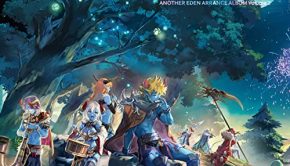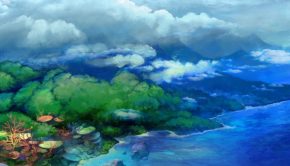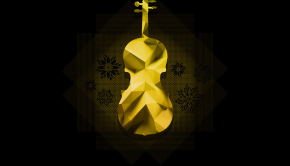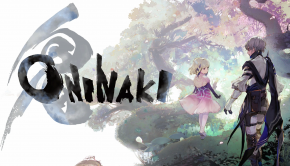Shadow Hearts Original Soundtrack
 |
Album Title: | Shadow Hearts Original Soundtrack |
| Record Label: | Scitron Digital Contents | |
| Catalog No.: | SCDC-00116/7 (1st Edition); SCDC-00403 (Reprint) | |
| Release Date: | June 17, 2001; January 16, 2005 | |
| Purchase: | Buy at CDJapan |
Commentary
Matsuzo Machida – Director
It was the beginning of the 20th century.
About to arrive at the future that we call the past.
The era during which our grandfathers and their fathers lived.
In this environment, so very different from today,
Darkness and Light became intertwined amidst the great upheaval
And at this very moment, one future was selected from among many.
Although it may seem like a distant past,
This history of hope and despair combined,
You need only to turn around.
Everything continues to this day.
As for proof, we need only look inside ourselves;
The blood that that era drew
Continues to run through our veins.
Hiroshi Aramata – Novelist
Regarding the Union of the Sorcery of East and West
Although time flows on, it is always branching off.
Although thoughts are individual, they are always connected.
For example, for every good in this world, many evils are brought about as a result. Although it is a good thing to live, many deaths occur as a result, and there is no one who enjoys death. Again, there are things that are impossible scientifically that were possible in an era when people believed in sorcery. That is because from the standpoint of the occult, sorcery is a technology as practical as science. Which is to say that science and sorcery come from the same source, and move in tandem. In this way, the adventure world of Shadow Hearts is a mirror, reflecting the reality of this world.
In the East, this kind of reality is called “in’yo.” On the reverse side of “yo” (Light) there is “in” (Shadow), and on the front of “in” there is “yo.” Because they are front and back, they cannot be separated at all. There is nothing that can split them. On the other hand, in the West, this is called “the eternal battle between gods and demons.” As it will never reach a conclusion, as long as the world continues good and evil will exist together. What is most fascinating is that these two worldviews coincide at one point: the realization that this world is not yet complete. It is in our attempts to complete it that humans’ wills and actions have their origin.
Recently I had a chance to go to England and speak with a modern-day alchemist. When I asked him why he worked so hard at alchemy in this era of science, he showed me an experiment. It was a simple alcohol distillation experiment; by collecting only the alcohol boiled off from a 50 percent solution, one can get no purer than approximately 90 percent. This is because there is steam in the air, and it will end up dissolving into the alcohol. By adding what alchemists call a “salt,” the water within the solution is absorbed, and the level of purity quickly rises. But it is still impossible to reach 100 percent pure alcohol. That is to say, 99 percent is the limit.
“The experiment to this point is the same as you would do in a school science experiment, but this is where the alchemist uses the Philosopher’s Stone. If the alcohol becomes pure, then you’ll even be able to change metal into gold!” Or at least that is how this modern day alchemist explained it to me. But there is no such thing as the Philosopher’s Stone in this world, I interjected, so any further experiments would be nonsense. This is how he replied: “No, you are forgetting that alchemy is part of the occult. The change that takes the alcohol that cannot be any purer than 99 percent in the real world and changes it into 100 is in the mind. If, through the experiments, one’s mind is purified, it will eventually become gold. I learned that from ancient Chinese alchemy, which is a more truly occult practice than that which went on in Europe during the Middle Ages. That was nothing more than misguided scientific practice.”
Although ancient China also had a practice of changing lower metals into gold, the goal was to change oneself into an immortal, perfected man. If the mind (the heart) is made complete then the body will be completed as well. So Chinese alchemy is the training of the heart. To complete the mind is to complete the world. Although the physical and the spiritual are separate, they are connected. Just as the mind (the heart) is able to affect matter, matter is able to affect the heart. One cries when experiencing unrequited love, but one may cry upon even hearing of an unrequited love.
In the world of the occult, as early as the Hellenism two thousand years ago and in the Middle Ages 700 years ago, East and West have united and given birth to novel developments. Computers, video games, and modern developments in art are all results of that happy union.
And now it is the 21st century. The virtual world of in (shadow) is daily becoming fused with the real world of yo (light). In the midst of this process, the forms of games and stories are changing. Until now the ones who had moved us with virtual stories had been other real human beings. Likewise, in games, we real human beings undertake enjoyable challenges in a programmed virtual world. But games have evolved, and now we have Shadow Hearts. Here our whims and ambiguities as real human beings are reflected in the game. The growth of our souls allows the game to mature.
That, I believe, is the real magic.
Jun Mihara – Producer
These Guys Did What They Wanted
Q: So, what happened with the music for Shadow Hearts?
A: My first reaction, listening to it, was “Do you guys want to be eaten alive?” or rather, “Did you think you could do anything you wanted?” The initial message Hirota received from director Matsuzo was to the point. “The beginning of the 20th century, in China and Europe. The main character is a devil-man. Also, there will be people going berserk.”
The music that sprung forth from those directions is recorded here. It has hard rock, ethnic music, Peking opera, weeping strings, sound skipping (like a broken record), and incantations. Do they think they can write whatever they want and leave us with something so jumbled? That’s how I reacted. It was a new kind of game music entirely. Jumbled… just as the word implies, it’s a mixture of a number of things, but it mysteriously fits together! That’s because the strong main themes lie buried, overtly and covertly, throughout. And the wild boy Hirota continued to bite into Matsuzo’s condensed words with his sharp teeth. That man’s powers of sublimation are abnormal! Yes, if I could only get the images to keep up, I thought, returning over and over to the world-class music in Shadow Hearts. Dammit, someday I’ll get him to sing.
Q: So, did Hirota and Mitsuda’s doing whatever they wanted work out?
A: Even though digital technology has evolved, we have to create “sounds” and “images” within the capabilities of the tools available. Even if something is created freely, it may have to be cut. As someone who plans the end from the beginning, I have to deal with the creator’s dilemma of compromise. But I never had to worry about this music. You may listen to it as freely as it was created. They are adventurous composers, in their prime, putting feeling into every piece. Though I may say such nice things, on the other hand, my cunning engineer’s spirit is grinning and laughing the whole time. Of course I was shocked.
A long time ago, Hirota and Mitsuda were war buddies. It seems like when they were young, they shared a desire to seek their spiritual food in music, and then they became what they are today. It seems like that kind of friendship. I haven’t asked whether or not they formed a band when they were younger, but I can imagine them having undergone numerous failures, as they have that level of familiarity.
Hirota’s music is fundamentally rock. The surfaces of his compositions seem very busy, but underneath lies a small air of dignity. This hidden subtlety comes out in “Sacrifice – ALICE” or “Castle of a silence,” for example. He would probably compare it unfavorably to Led Zeppelin’s Immigrant Song, but I think that the superb rock number “Sign of him (creation of god)” shows his true nature.
On the other hand, Mitsuda may have a kind, boyish face, but he can be a simple drunkard, too. His sometimes quite daring melodies and rhythms have already garnered him much attention, and now, in “Misfortune -Psycho temple-” and “China ogre,” one can clearly see him venturing into new territory. And “Steel soul -Tanjou,” the accompaniment to the passionate drama between a father and son that forms the game’s main theme, is a masterpiece that fits its subject perfectly. Going beyond mere work, the main and sub composers Hirota and Mitsuda have expanded the game’s individual world greatly, forming a team with Iwata, Fukuda, Kuroda, and all the other “ta’s” and “da’s.” Truly, thank you.
Q: So, everyone, what happened with the music to Shadow Hearts?
A: This may be a morbid thought, but it has become so ingrained in me that I would like to have it played at my own funeral.
Translated by Ben Schweitzer. Edited by Ben Schweitzer and Chris Greening. Please do not republish without written permission.
Posted on May 9, 2013 by Ben Schweitzer. Last modified on March 9, 2014.














